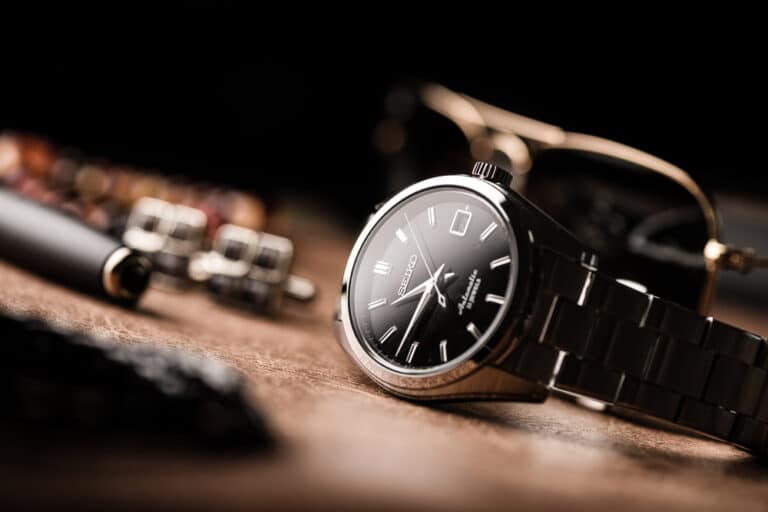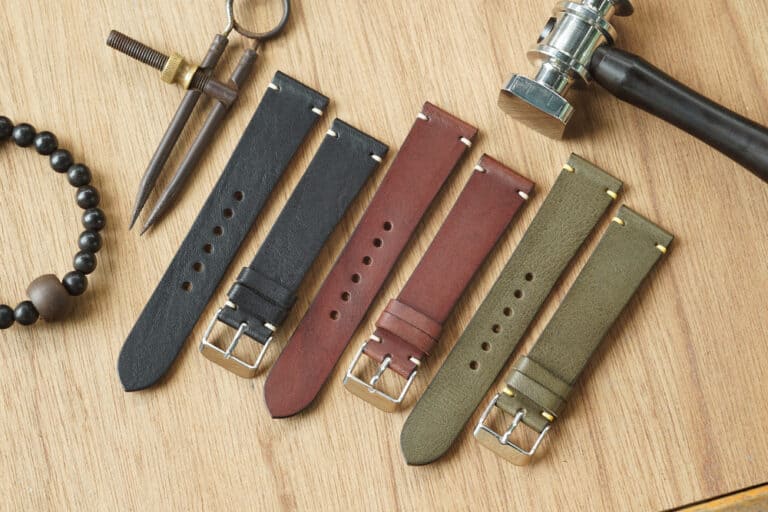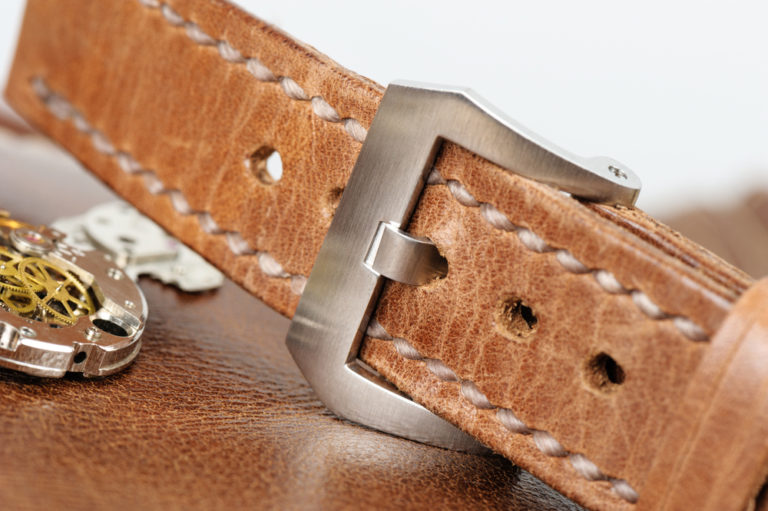Steel was the metal of choice for decades for watches, but recently, a new metal has been trending. Titanium is the new kid in town, but what makes it so special? How does it differ from steel, and, more importantly, is titanium better than steel for a watch?
Titanium is hypoallergenic, making it a much better watch option for people with sensitive skin. Titanium also has a higher strength-to-density ratio that makes it much stronger than steel, but steel is more scratch resistant, easier to work with, and has more luster.
While titanium is a clear winner for those with sensitive skin or allergic to nickel, stainless steel has many qualities that may make it more appealing to you.
Is Titanium Better Than Steel For A Watch?
While titanium and steel are popular watch choices, they have very different characteristics.
An obvious difference between titanium and steel is the elements they are made of; thus, their chemical composition differs, and so do their durability, weight, and several other factors. Let’s take a closer look.
Titanium Vs. Steel: Composition
The most notable difference between titanium and steel is their chemical composition. Titanium and steel are not the same, so let’s take a look at the differences:
Titanium
Titanium is a metal found in nature, with an atomic number of 22. Pure titanium is extremely strong and very lightweight. However, it is also very reactive.
Therefore, an alloy (blend) of titanium is used in watchmaking. Grade 2 titanium is referred to as “pure” titanium as it contains nearly 100% titanium (98.9%) but is alloyed with about 1% iron, oxygen, and other trace elements.
While grade 2 titanium is often used in watchmaking, grade 5 is more commonly used. Grade 5 titanium is slightly stronger and more resistant to corrosion than grade 2 titanium due to the alloy’s presence of vanadium and aluminum.
Both grade 2 and grade 5 are considerably stronger when compared to steel.
Steel
The bigger difference in composition between steel and titanium is that steel is not a metal but an alloy. Steel is composed of an alloy of carbon and iron. While iron is a metal, carbon is a non-metal, so therefore steel cannot be considered a metal.
In addition to the alloy of iron and carbon, stainless steel contains a minimum of 10.5% chromium. The chromium helps prevent oxidation and gives “stainless” steel its name.
There are two kinds of stainless steel commonly used in watchmaking: 316L and 904L. Both contain the base alloy of iron, carbon, and chromium, along with nickel and other trace elements.
316L stainless steel is often called surgical steel due to the molybdenum in the alloy that prevents corrosion. It is commonly used for piercings, medical applications, and jewelry. 316L is the most popular steel for watches.
904L, on the other hand, is more corrosion resistant than 316L, thanks to the additional copper and silicon added to the alloy. Although it is the better steel between the two, it comes with a price tag that makes it more suited for luxury brands like Rolex.
Titanium Vs. Steel: Durability
A quality watch can last a lifetime when you take care of it properly. However, high-quality watches can be expensive, so choosing a durable material capable of withstanding wear and tear makes sense.
Titanium
Titanium has an incredibly high strength-to-weight ratio, making it one of the strongest metals in the world. It is this strength-to-density ratio that makes titanium so appealing.
Along with a desirable strength, titanium is also anti-magnetic. While a magnet won’t ruin your watch, it can slow down and even stop the watch’s time. Using anti-magnetic materials in watches will help keep your watch accurate and save you the trouble of demagnetizing your watch.
Titanium is heat resistant and highly resistant to corrosion. All these characteristics make titanium extraordinarily durable. It is titanium’s high resistance to corrosion that makes it a suitable material in diving watches, which needs to withstand exposure to high salt levels without rusting.
Despite titanium’s strength, it is quite soft. The softness is an advantage on one hand as it makes the metal pliable and, therefore, will bend rather than shatter. On the other hand, titanium scratches fairly easily due to its softness.
Steel
Steel may not be as strong as titanium, but it is still incredibly strong. After all, superman wasn’t referred to as the man of steel for no reason.
While titanium is about three times stronger than steel, it’s worth bearing in mind that after a certain threshold, the strength becomes irrelevant. After all, it is a watch, not a space rocket.
Like titanium, stainless steel is heat-resistant at elevated temperatures. Steel has good corrosion resistance, and although not as much as titanium, it is adequate for everyday wear.
One aspect of steel that makes it highly appealing is its scratch resistance. Steel is a harder material than titanium, making it virtually indestructible.
Titanium Vs. Steel: Weight
While the weight of a watch can easily go unnoticed in the day-to-day, it can make a sizable difference as far as sports watches are concerned.
Titanium
Titanium is extremely lightweight. When comparing two watches that are identical in design, one in steel and the other in titanium, the titanium watch will be nearly half the weight of the steel watch.
Titanium’s light weight is a particularly attractive feature for sports watches and watches with a hefty design. A titanium sports watch can be between 40 and 50% lighter than its steel companion, and though the few ounces may not seem like much, it is noticeable on your wrist.
Steel
Steel has been a firm favorite among watchmakers for decades, and many collectors are used to the weight and feel of a steel watch.
While titanium’s weight is an advantage in bulkier watches and sportswear when it comes to everyday wear and luxury watches, the importance of the watch’s weight comes down to personal preference.
Surprisingly, many people prefer the heavier weight of a steel watch. Although not accurate, a heavier watch feels more expensive.
Titanium Vs. Steel: Appearance
A watch tells the time, sure, but more often than not, it makes a statement. After all, a watch is a fashion accessory, and appearance matters when it comes to fashion.
Titanium
At first glance, titanium and steel look similar. Granted, depending on the design and craftsmanship of the watch, titanium, and steel can look near identical. However, you will notice that titanium has a greyish appearance upon closer inspection.
In addition to a greyish appearance, titanium has a brushed look. It has less luster than steel and appears to have a matt finish. While this may be unappealing to some, it is part of titanium’s charm and one of the top reasons some prefer titanium above steel.
The allure of titanium has also been magnified by popular culture, sci-fi movies, and titanium’s use in aerospace and the military. As it has been used in futuristic settings, we associate the matt finish and greyish color with space, futurism, and high tech.
Steel
Compared to titanium, steel has a clearer color similar in tone to silver. While steel can be brushed-finished, it is more often polished. The reason for this is to differentiate it from titanium.
For a polished look, titanium cannot compare with steel. Polished steel watches are shinier and flashier. It is more eye-catching and less subtle than titanium, much like high-end fine jewelry.
The polished, shiny look of steel mimics that of white gold or platinum and gives a crisp, clean look to your outfit that has a timelessness. Steel will also complement any dazzling jewelry pieces it accompanies, adding to its popularity.
Unquestionably, appearance is subjective. Some prefer the subtlety of titanium, while others love the flashier look of a shiny steel watch.
Titanium Vs. Steel: Allergens
If you have oversensitive skin, it’s crucial to choose a hypoallergenic watch that won’t give you a rash. No matter how strikingly grand your watch is, you won’t want to wear it if you itch and break out every time you wear it.
Titanium
Titanium is one of the most hypoallergenic metals in the world. Choosing a titanium watch is the most comfortable and safest option for people with severe skin sensitivity or nickel allergies. The natural oxide layer covering the titanium’s outer surface creates a protective layer between the metal and your skin.
Steel
Steel is often alloyed with nickel, one of the main culprits of contact dermatitis. Some steel grades contain a smaller percentage of nickel that may be acceptable for people with a mild allergy. Still, even a small percentage of nickel can cause a severe allergic reaction in those with very sensitive skin.
Luckily, there are hypoallergenic steel alloys, but if you have sensitive skin, you should be careful when purchasing steel watches.

Titanium Vs. Steel: Comfort
A good quality watch will likely be worn regularly, if not daily. Therefore, comfort is an important factor to consider when choosing a watch. How do titanium and steel compare in terms of comfort?
Titanium
The durability of titanium makes for comfortable wear. As titanium is strong, you don’t need to worry about damaging your watch, and the heat resistance means you won’t feel a difference when wearing your watch outside on a scorching day.
With its hypoallergenic qualities and light weight, titanium is extremely comfortable to wear. Smaller watches can feel almost like not wearing a watch at all!
Although titanium scratches easily, the brushed look hides the scratches well, and the protective oxide layer almost “heals” micro-scratches.
Even so, titanium’s softness can be one factor that may make titanium watches less comfortable to wear. Simply put, if you are overly aware of the possibility of accidentally scratching your watch, opt for steel.
Steel
Like titanium, steel is heat resistant. Although not quite as heat resistant as titanium, steel will still be comfortable unless it’s incredibly hot outside or you are exposed to higher heat, such as a camping fire.
Steel is durable and stainless steel doesn’t scratch easily. Steel watches can be just as comfortable as titanium ones if you are not allergic to nickel or have sensitive skin and are not bothered by steel weight.
Titanium Vs. Steel: Cost
While a high-quality watch is an investment, the cost should be reflected in the make-up of the watch. Are you paying for brand or quality?
Titanium
Titanium watches can easily cost twice as much as stainless steel watches. There are several reasons for the increased cost:
- Although titanium is not a rare metal, it is rarer than many other metals, including iron, of which steel is made
- Titanium is not often found in pure form, and the process of purifying titanium is costly
- Due to titanium’s strength, it is not as easy to cast and work with as steel, silver, or gold, and specialized equipment is needed to process titanium into finished products
- Since titanium is difficult to work with, it is more labor intensive, which adds to the cost
- Named after the titans of Greek mythology, titanium has an almost mythical “super power” quality. Titanium’s name, combined with its use in military and sci-fi movies, makes it appealing and allows producers to charge more
Steel
Stainless steel is considerably easier to work with than titanium. It is also easier to cast due to the iron content. Not only is stainless steel watch manufacturing less labor intensive, but steel is also more common than titanium, making steel much more affordable.
316L stainless steel watches offer a high-quality steel watch at a fair price.
904L is more expensive than 316L, but the difference in strength and quality does not justify the steep price. When buying a watch made of 904L stainless steel, it is likely from a high-end brand like Rolex, in which case you are paying for the brand name and not the superior steel used in manufacturing.
What Are Luxury Watches Made Of?
Steel and titanium are only two materials used in watchmaking, and while they are often used in everyday watches, both of popular materials for luxury watches as well. If you are fascinated with luxury watches, you may wonder what other materials are available in the world of luxury watches.
Of course, gold is on the top of the list for luxury watches. Gold has been associated with wealth and luxury since ancient Egypt, and not much has changed in this regard.
Gold offers a variety, from 9ct to 18ct in yellow, rose, or white. Yellow gold is a firm favorite that brings an elegance to the watch unmatched by any other material.
Other materials often used in luxury watchmaking include:
- Platinum
- Ceramic
- Moonshine gold – a warmer and less saturated yellow gold alloy patented by Omega
- Aluminum
Conclusion
Ultimately, whether or not titanium is better than steel for you will depend on your personal style and what is most important to you in terms of watches.
For those with sensitive skin, titanium is a safer option, but steel has many of the advantages of titanium at a lower price point for those without skin sensitivities.
References
- https://www.quora.com/Are-titanium-watches-better-than-stainless-steel
- https://www.gearpatrol.com/watches/a353466/titanium-watches-explained/
- https://www.luxuo.com/style/watches/titanium-watches-everything-you-need-to-know.html
- https://www.youtube.com/watch?v=eMCYsp3Tojc
- https://www.forbes.com/sites/matthewcatellier/2020/12/11/the-trend-towards-stainless-steel-watches-continueswill-precious-metal-come-back-into-style/?sh=495e49a468c1







